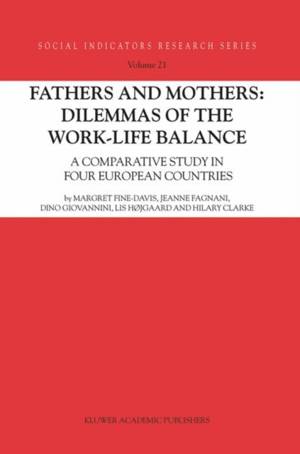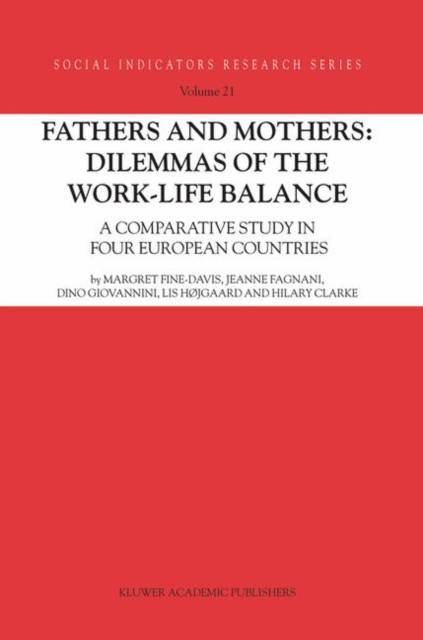
Je cadeautjes zeker op tijd in huis hebben voor de feestdagen? Kom langs in onze winkels en vind het perfecte geschenk!
- Afhalen na 1 uur in een winkel met voorraad
- Gratis thuislevering in België vanaf € 30
- Ruim aanbod met 7 miljoen producten
Je cadeautjes zeker op tijd in huis hebben voor de feestdagen? Kom langs in onze winkels en vind het perfecte geschenk!
- Afhalen na 1 uur in een winkel met voorraad
- Gratis thuislevering in België vanaf € 30
- Ruim aanbod met 7 miljoen producten
Zoeken
Fathers and Mothers: Dilemmas of the Work-Life Balance
A Comparative Study in Four European Countries
Margret Fine-Davis, Jeanne Fagnani, Dino Giovannini, Lis Højgaard, Hilary Clarke
€ 153,95
+ 307 punten
Uitvoering
Omschrijving
At the risk of sounding frivolous, there is a good case to be made for the argument that women constitute the revolutionary force behind contemporary social and economic transformation. It is in large part the changing role of women that explains the new household structure, our altered demographic behaviour, the growth of the service economy and, as a consequence, the new dilemmas that the advanced societies face. Most European countries have failed to adapt adequately to the novel challenges and the result is an increasingly serious disequilibrium. Women explicitly desire economic independence and the societal collective, too, needs to maximise female employment. And yet, this runs up against severe incompatibility problems that then result in very low birth rates. Our aging societies need more kids, yet fertility levels are often only half of what citizens define as their desired number of children. No matter what happens in the next decade, we are doomed to have exceedingly small cohorts that, in turn, must shoulder the massive burden of supporting a retired baby-boom generation. Hence it is tantamount that tomorrow's adults be maximally productive and, yet, the typical EU member state invests very little in its children and families.
Specificaties
Betrokkenen
- Auteur(s):
- Uitgeverij:
Inhoud
- Aantal bladzijden:
- 352
- Taal:
- Engels
- Reeks:
- Reeksnummer:
- nr. 21
Eigenschappen
- Productcode (EAN):
- 9781402018480
- Verschijningsdatum:
- 3/03/2004
- Uitvoering:
- Paperback
- Formaat:
- Trade paperback (VS)
- Afmetingen:
- 156 mm x 234 mm
- Gewicht:
- 539 g

Alleen bij Standaard Boekhandel
+ 307 punten op je klantenkaart van Standaard Boekhandel
Beoordelingen
We publiceren alleen reviews die voldoen aan de voorwaarden voor reviews. Bekijk onze voorwaarden voor reviews.









